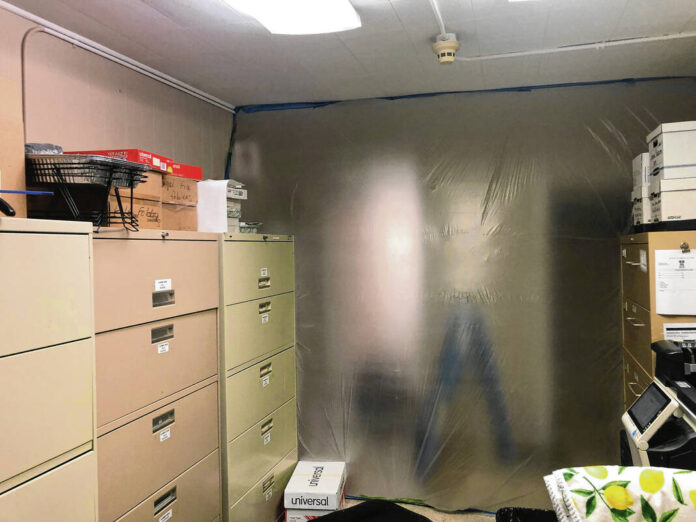
Plastic seals off part of the Hancock County Prosecutor’s Office after air quality concerns were discovered.
Submitted photo
HANCOCK COUNTY – After the presence of black mold was confirmed at the county prosecutor’s office, officials approved up to $500,000 in emergency funding to remediate contents in the building and move the department to a new location.
In the meantime, prosecutor’s office staff continue to work remotely and leaders expect it will be weeks before they’re able to be under one roof again.
The decisions follow what officials were hoping would be a temporary closing of the prosecutor’s office last week after the start of a bathroom renovation led to the discovery of mold and harsh odors.
A subsequent air quality evaluation in the building reported above-average concentrations of black mold, which contains toxins, prompting the Hancock County Commissioners to declare an emergency during their meeting on Tuesday. They also voted to allocate up to $400,000 from non-property tax-backed funds to remediate contents inside the prosecutor’s office and move the department to the current Hancock County Community Corrections building. The Hancock County Council voted Wednesday to increase that amount to $500,000 and take it from food and beverage taxes. The matter will be set for a public hearing and vote at the council’s December meeting.
The commissioners also voted to give the board’s president – a position currently held by John Jessup – authority to make emergency decisions throughout the transition.
The building housing the prosecutor’s office at 27 American Legion Place in Greenfield was first built about 130 years ago and has been added onto over the decades. Operational issues have mounted at the property in recent years, from a collapsing ceiling to a bat infestation. County officials had already intended to move the prosecutor’s office to the community corrections building and move community corrections to the county’s former jail, but the mold issue is forcing a quicker – and costlier – timeline.
Jessup said the remediation at the prosecutor’s office will consist of cleaning furniture, equipment, employees’ personal items and even plants.
“Anything that has to leave that building has to be cleaned by a remediation specialist before it can be taken out of that building,” he said, in order to ensure mold spores don’t follow items into the new location.
That also includes files, which fill boxes in the prosecutor’s office. Jessup said if a box has a lid and is closed, files will be removed and placed in a new box. For boxes that don’t have lids, the tops of files will be cleaned with a vacuum equipped with a high efficiency particulate air filter before being treated with a chemical.
DLZ, an Indianapolis-based architecture firm working for the county on the projects planned for the community corrections building and former jail, presented the commissioners with adaptations to the plans to accommodate the quicker-than-anticipated moves. Officials with the company said work can be phased in a way that would allow the prosecutor’s office to move into half of the community corrections building while work is underway on the second half. When work on the second half is completed, prosecutor’s office staff can move there so the rest of the building can be finished. A similar phased approach can be taken at the former jail for community corrections, DLZ officials said.
Jessup said the details and costs of the construction at the buildings spurred by the emergency remain to be determined.
It’s important that the money for it not come from property taxes, he said. The work that had already been planned for the community corrections building and old jail before the emergency will be funded by two respective general obligation bond issues, which are backed by property taxes. State law is stringent on how general obligation bonds are used for projects, and Jessup said it would be best for accounting purposes if funding for any work prompted by the emergency came from somewhere other than property taxes.
“We’ve got to be careful so as to not muddy up the waters,” he said.
County officials also said this week that insurance may end up covering some of the costs of the emergency.
Along with costs, another unknown is the timeline. The commissioners estimate the prosecutor’s office could be up and running in its new location in two to six weeks, but emphasized it could be longer.
Marc Huber, a county commissioner, said the course of action is not ideal but dire.
“I don’t like it, but it’s where we’re at today,” he said.
Bill Spalding, also a commissioner, supported the plan as well.
“We’ve got to put people somewhere for the safety and well-being, the health of the people in the prosecutor’s office,” he said. “This is just the area that’s going to be able to make it happen.”
Hancock County Prosecutor Brent Eaton said while plenty of details remain to be determined, the plan seemed like a serviceable interim solution.
“It’s a substantial improvement over no building,” he said.




